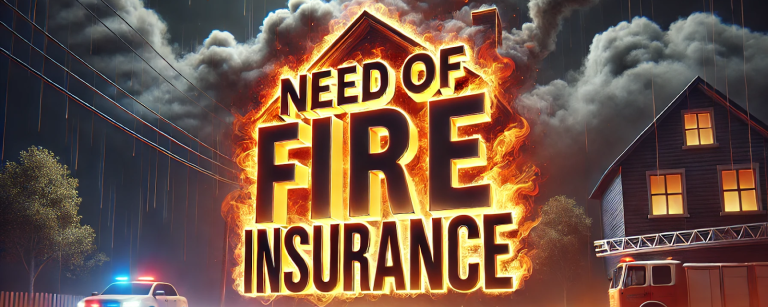Fire insurance is one type of security through which one will be saved financially from fire accident destruction. One needs fire insurance because it gives protection against catastrophic financial damage and loss of life, assets, and businesses as a result of fire accidents. Fire insurance therefore allows an individual to rebuild property with minimum stress on their purse.
Fire insurance ensures that the firms and families maintain continuity by cushioning losses when those incidents occur because it provides instant compensation. Apart from this monetary reimbursement, fire insurance also gives that security feeling and ensures that quick recovery and rebuilds are affected. Many extended allied risks by fire insurance embrace explosions and smoke damage. This protection helps not to disrupt long-term planning with unexpected occurrences. Fire insurance, therefore, becomes an absolute investment for comfort and stability. With increasing fire accident cases worldwide, there is an even greater need to have strong fire insurance coverage. It allows individuals and organizations to overcome crises without being financially destroyed and protects their future dreams.
What is Fire Insurance?
An insurance policy is a legally enforceable contract that exists between the insurer and the individual or business. A fire insurance policy allows the insurer to get indemnified from the insured of losses occurring on account of fire, smoke, lightning, or any coincident happening. In case a loss occurs, this will not have an impact on the soundness of the insured party’s finances.
Fire insurance policies are issued for residential properties, commercial establishments, machinery, and personal belongings. The main function of a fire insurance policy is that once a fire damages any of these properties, the cost for repair, restoration, or replacement is ensured by the policy’s terms. Shifting the burden to the insurer brings comfort and a safety net during tough times.
Importance of Fire Insurance
Fire insurance plays a critical role in dealing with the unforeseen and sometimes disastrous effects of fires. Fire might cause permanent destruction to property and assets, rendering individuals and organizations susceptible to being financially crippled. The nature and scope of fire insurance is a vast topic to discuss in total. However, the importance of fire insurance, therefore, is that it allows for a staged recovery process; losses are made good, and normalcy returns.
- Financial Protection and Recovery: It helps pay for losses from fire damages with monetary compensation that does not involve the depletion of personal or business funds for those insured. Such insurance also offers coverage on building, equipment, and other property repair and restoration costs. The homeowner is guaranteed to rebuild; the business may continue its operations even when there have been huge losses.
- It encourages safety measures: An insurer promotes the owner of the property to fit alarm, sprinkler, and fire extinguisher safety equipment. All these help in reducing the probability of fire occurrence and, in some places, earn the owner discounts on their premiums. Therefore, fire insurance is not only a protection but also an encouragement of proactive safety.
- Legal and Financial Compliance: Many legislations and financial institutions mandate fire insurance on a property loan or business operations. This makes an individual and his business prepared in case of an unplanned event while being compliant with regulatory and contractual requirements. As an example, most mortgage lending companies require it as protection against their investment.
The Need of Fire Insurance
A world, where a fire accident becomes an order of the day, often resulting in heavy losses cannot be ignored; hence, fire insurance is needed. For individuals, businesses, and communities the security it provides when disaster strikes unexpectedly is priceless.
It is essentially a must for homeowners.
Fire insurance is precautionary safety against the disastrous effects of fire accidents, which is essential for financial protection and peace of mind. Fire may strike at any given time and therefore cause destruction to property, assets, and infrastructure. Without fire insurance, such a loss would fall on the individual, business, or public institution. This kind of risk is reduced when fire insurance is provided with full coverage, and speedy recovery and stability are ascertained.
For Home Owners: Homeowners are the most vulnerable victims of fire disaster impact since it can destroy years of work and sweet memories. Fire insurance covers all costs involved in repairing or reconstructing damaged houses, whether it is structural aspects or personal property. Most policies cover other living expenses, alternative housing, cost of foodstuffs, among others, to ensure that families have enough time to live as they would until the repairs are made. These buffers have a very minor emotional and economic impact on housekeepers.
For Business: Fire insurance is considered one of the most critical forms of risk management for any given enterprise. Fire results in losses of stock, machinery, and equipment plus other components that compose operational infrastructure responsible for loss resulting from business failure. Compensation to recover funds as in regaining properties’ destruction plus income by recovering the productive usage of any idled down machinery and tools puts back working machines into activities immediately possible once they have the tools put back.
In Public Institution
Public institutions: Fire insurance is also of top priority for public institutions like schools, hospitals, and government offices. These structures are very essential to the social order, and it should return to normal operation shortly after a fire calamity. The coverage will replace the infrastructure and restore vital equipment that would limit the interruption of service. This adds to the community’s resilience and avoids widespread social disruption.
In conclusion, fire insurance might be considered more of an aid in preparedness, recovery, and stabilization in case of unforeseen catastrophes, rather than just a financial product. To say the least, the necessity of the thing can’t be downplayed, and usually, one needs it when individuals, businesses, and communities do.
Types of Fire Policies
To select the right one, it is quite essential to know the different types of fire insurance policies. Every type caters to different needs and has different fire insurance policy features hence offers solutions based on those needs.
Specific PoliciesSpecific fire insurance provides financial protection for damage to only one single predefined property. These are perfect policies for low-risk properties so that there will be financial protection for that property. The house owner might cover his house. A small business owner can protect only his primary office or shop.
- Comprehensive Policies: These cover extensively, among other risks than just fire. Natural catastrophes such as floods and earthquakes include theft during a fire incident. Comprehensive policies are great for individuals and business people seeking to have maximum financial security since they address various risks all under one cover.
- Floating Policies: Floating policies are suited for businesses whose owner has property at different locations. A floating policy, instead of purchasing a separate policy for each location, combines all the coverage into one single sum insured. This simplifies the management is less expensive and is usually preferred to companies owning warehouses, retail stores, or factories distributed in various regions.
- Policy Type Coverage: Specific Policy Covers damage to a single predefined property.
Comprehensive Policy covers broad damages resulting from fire, natural calamities, and theft. Floating Policy Under this cover, movable or multi-location assets fall under a single sum insured.
- Replacement Value Policies: The above policies ensure that the insured party gets a sum equivalent to the full replacement cost of property that the is damaged. This rules out any kind of financial inconsistencies and ensures the property can be returned to its former state. The replacement value policies are of immense help for those businesses that deal with costly machinery or machinerynery
- Valued Policies: Valued policies involve a predetermined compensation amount agreed upon at the policy’s inception. This ensures clarity during claim settlements and avoids disputes over the valuation of losses. These policies are particularly beneficial for assets with fluctuating market values, such as antiques or rare items. It will indicate rich information that pertains to the benefits of reaping when taking fire insurance.
Benefits Of Fire Insurance Policy
Fire insurance is not merely an investment product because it is the backbone of the security of people and business communities against all eventualities. In addition to monetary returns, other benefits constitute a psychological comfort measure, legal adhesion, and risk management aspects. The following is detailed information regarding the benefits related to it.
Recovery in terms of finance
Injury and sometimes irreparable damage in terms of structure, machinery, inventory, and personal belongings occurs in a fire accident. Fire insurance gives essential financial cushioning to obviate the obligation on policyholders to carry such costs.
- Residential Impact: Fire insurance pays for homeowners to repair or rebuild damaged structures and replace destroyed personal belongings. Many families may suffer long-term financial disability without such support.
- Commercial Impact: The business relies on fire insurance to cover losses that would otherwise shut it down. It encompasses compensation for destroyed inventory, damaged machinery, and structural repairs to ensure companies get back to business in the shortest time possible.
- Avoiding Bankruptcy: Fire insurance helps people and organizations avoid draining their savings or bankruptcy by taking the financial blow of fire damage. It helps them recover and rebuild without jeopardizing their future financial security.
Peace of Mind
The emotional impact of a fire is massive, and most of the time, the victims are left uncertain and fearful about what may happen next. Fire insurance provides a peaceful mind since they know their finances are secured in case of such a disaster.
- Ptechnologicalical Security: The policyholder will be bothered with recovery instead of worrying over how much it is going to cost them in the repair or reconstruction. Anxiety and stress of this kind, thus are lifted from adversity.
- Confidence in Stability: Businesses will be secure enough to invest and expand for they are ensured the security given their assets have been accorded. Families, too, will be assured over their homes -even those risky ones with tendencies for fire risk.
- Support During Crisis: Insurance companies usually help their clients process claims and even rebuild after disasters, be it in monetary or paperwork terms, thus returning to normalcy relatively without a hitch.
Adherence to the Law
Some so many properties and businesses require fire insurance by force of law. In case the proper arrangement is not made, this failure will attract other forms of punitive measures such as penalties in courts, loss of finances, and injury reputations.
- Other Requirements: Various governments demand certain types of businesses usually about public safety, dangerous processes, and many others like restaurants, manufacturing places, and even chemical storage locations.
- Loan and Mortgage Conditions: Any loan or mortgage requires fire insurance. This is simply because the money they lend needs to be recovered, and the property needs to be restored in case of damage through fire.
- Avoiding Fines and Litigations: Failure to observe the terms regarding fire insurance shall lead to a set of fines, litigations, or loss of business operations. Securing fire insurance entails acceptance to strictly adhere to all the legal compliance that shall also eliminate more inconveniences.
Safety End
Fire insurance, in addition to post-incident recovery, also creates a culture that develops and enforces active practice which diminishes the possibility of risk. Sometimes, preference benefits are given to those who take preventive safety measures through insurance companies. Thus, security culture develops.
- Incentives for Fire Safety Attributes: Most insurance companies usually offer rebates on premiums if the property has installed fire safety equipment, such as smoke detectors, fire alarm systems, and sprinkler systems. This reduces the possibility of fires and decreases premiums.
- Awareness: the policies of fire insurance normally comprise directions or inspection that ensure standards for compliance in safety. This makes the property owners aware of the risks involved and the need to prevent the disaster.
- Benefits of the Community: safer properties improve the community and business district as a whole and minimize collective risk in the event of a fire disaster. This requires shared responsibility among members towards preventing a fire disaster.
Need Of Fire Insurance FAQs
What is the main objective of fire insurance?
Mainly, fire insurance provides financial compensation for damages that should ensure that people and businesses can easily recover and rebuild without bearing all the financial burden.
Who needs fire insurance the most?
Homeowners, businesses, and public institutions all need fire insurance to protect their assets and continue operations after suffering a fire incident.
What damages are covered by fire insurance?
Fire insurance covers damage to structures, inventory loss, machine replacement, and even accommodation or relocation for the time being.
Are there any laws requiring fire insurance?
Fire insurance is typically legally or contractually required especially if the property is used as a security in loan facilities or acquiring a business license.
How do premiums of fire insurance work?
Premiums depend on the value of the property, risk factors, and the extent of coverage. Discounts may be applied for properties with advanced fire safety measures.


